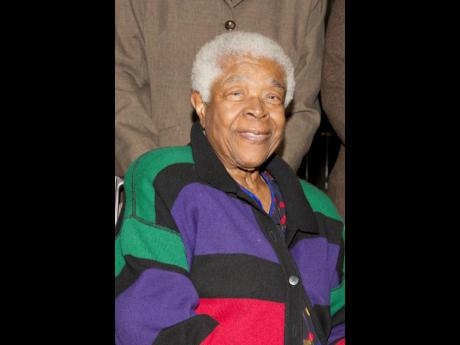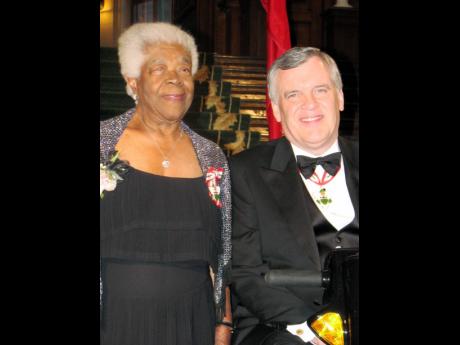Jamaican-Canadian centenarian named to the Order of Canada
TORONTO:
A Jamaican-Canadian centenarian has been named among the 78 new appointments to the Order of Canada – one of the country’s highest honours – “for her long-time dedication to improving public health within the black community, notably through the creation of the Sickle Cell Association of Ontario”.
Lillie Johnson, 101, founder of the Sickle Cell Association of Ontario (SCAO), has been a strong advocate for education about sickle cell disease, and started the organisation in 1981. In 2011, she was invested into the Order of Ontario, the province’s highest honour, for her work with the organisation.
Mary Simon, governor general of Canada, said: “I greatly value the opportunity to celebrate individuals whose perseverance, ingenuity and community spirit have benefited Canadians throughout the country. As governor general, I have seen first-hand that our communities are rich in both excellence and diversity, which we need to do our utmost to recognise. I encourage each of us to become catalysts for the change we want to see in the Canadian Honours System by nominating individuals whose exceptional accomplishments may have gone unrecognised through the years.”
Johnson was born on March 16, 1922 in St Ann, Jamaica and, after completing her education at Wolmer’s High School for Girls and at Shortwood Teachers’ College, she worked as a teacher in Jamaica.
She eventually left to study nursing in England in December 1950, arriving in January 1951, and travelled to Edinburgh, Scotland to start her training.
After completing her studies in Britain, Johnson returned to Jamaica where she worked at the University College of the West Indies Hospital in Kingston. From there, she went to New Jersey in the United States in 1958 to work at the Beth Israel Hospital in Newark.
Johnson travelled by train from New York, where she visited family, to Canada in August 1960.
RELENTLESS LEADERSHIP
Karen Flynn, an associate professor in the Department of Gender and Women’s Studies and the Department of African-American Studies Program at the University of Illinois Urbana-Champaign, is the author of Moving Beyond Borders: A History of Black Canadian and Caribbean Women in the Diaspora, which features Johnson on the cover.
She praised Johnson’s leadership, initiative, dedication, and advocacy around sickle cell. During the 1960s and 1970s, Johnson visited many patients with sickle cell disease (SCD), a life-threatening condition characterised by severe, unpredictable painful episodes and complications that can limit daily activities and cause disability.
“To understand Johnson’s impact requires thinking about the presence of black people in Canada and the lack of knowledge about SCD. Black people made up only 0.2 per cent of the Canadian population, and the specific issues they face, such as SCD, was not yet on the public agenda. That is, sickle cell and its genetic and hereditary configuration was largely unknown, a reality that, Johnson recognised, had profound implications, including the threat of death,” says Dr Flynn, who was recently selected as the first Terrance & Karyn Holm Endowed Professor and director of the Midwest Nursing History Research Centre, housed at the University of Illinois Chicago College of Nursing, starting in 2024.
She said it was the lack of knowledge among physicians and other healthcare providers, coupled with Johnson’s interactions with sickle cell patients that led to the birth of the Sickle Cell Association of Ontario. Together, Johnson and five other committed individuals conducted the organisation’s work from their respective homes.
Dr Flynn said Johnson’s relentless leadership and advocacy work has resulted in several notable achievements. The most significant accomplishment to date for Johnson and the SCAO is the decision by the Ontario’s Ministry of Health and Long-Term Care to include sickle cell disease on the list of 28 genetic diseases for newborn screening (NBS).
“It is important to underscore how long this victory was in the making, in Johnson’s own words – ‘Every year from 1981, we went to Queen’s Park to get them to pass the law until it was passed in 2005’,” said Flynn, noting that other accomplishments were the development of a specialty centre for those with sickle cell, and the SCAO and TAIBU Community Health Centre working in partnership with the Scarborough Hospital to establish an emergency department protocol for sickle cell patients.
TRUE LIFE OF SERVICE
In March 2015, one day before her 93rd birthday, Johnson launched her memoir, My Dream, as part of the Canada 150 Memoirs Project.
Johnson has been a member of the Jamaican Canadian Association (JCA) since its inception in 1962. She was also active on the women’s committee and was a generous supporter of the organisation.
Former president of the JCA, Adaoma Patterson, said Johnson has been a pillar of the black and Jamaican-Canadian community in Toronto for many decades. “She has been a steadfast champion of public health, healthcare, and sickle cell disease in particular, creating awareness, supporting individuals and families dealing with disease, and pushing elected officials and the medical community to take it seriously.”
Patterson said, like the JCA and other foundation members, Johnson “blazed a trail, breaking barriers and refusing to accept the boundaries that Canadian society placed on black people, in general, and black women, in particular”. Johnson was a regular participant in the JCA’s Annual Walk Good Walkathon, raising funds for that organisation and the SCAO.
Johnson is also featured in the Jamaica 50th anniversary publication, Jamaicans in Canada: When Ackee Meets Codfish.
“Ms Johnson has led a true life of service, using her skills, talents, and passion to make life better for others, and serves as a testament to the statement ‘lifting as we climb’. Her drive, determination and vision have made our community and Canada a better place,” said Patterson.
More than 7,600 people from all sectors of society have been invested into the Order of Canada since its creation in 1967, Canada’s centennial year.


